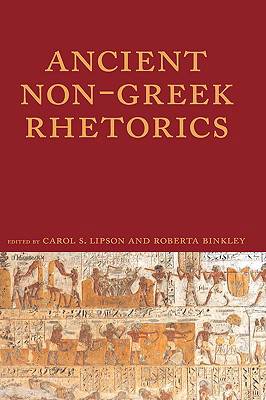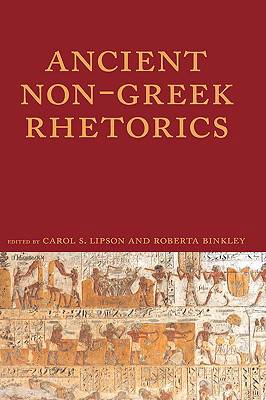
- Retrait gratuit dans votre magasin Club
- 7.000.000 titres dans notre catalogue
- Payer en toute sécurité
- Toujours un magasin près de chez vous
- Retrait gratuit dans votre magasin Club
- 7.000.000 titres dans notre catalogue
- Payer en toute sécurité
- Toujours un magasin près de chez vous
Ancient Non-Greek Rhetorics
44,95 €
+ 89 points
Description
ANCIENT NON-GREEK RHETORICS contributes to the recovery and understanding of ancient rhetorics in non-Western cultures and other cultures that developed independently of classical Greco-Roman models. Contributors analyze facets of the rhetorics as embedded within the particular cultures of ancient China, Egypt, Mesopotamia, the ancient Near East more generally, Israel, Japan, India, and ancient Ireland. The ten essays examine rhetorics as broadly construed, analyzing texts, addressing silence, as well as considering the placement and use of texts as part of multimedia cultural communication, involving ritual along with oral, visual, sensual, experiential, and architectural elements and performances. CAROL S. LIPSON is Professor of Writing and Rhetoric, and immediate past chair of the Writing Program at Syracuse University. She received her PhD in English at the University of California-Los Angeles, where she began the study of Egyptology. She has published on ancient Egyptian medical rhetoric, on the multimedia nature of ancient Egyptian public texts, and on the central Egyptian value of Maat in relation to the culture's rhetorical principles. With Roberta Binkley, she co-edited RHETORIC BEFORE AND BEYOND THE GREEKS (SUNY Press, 2004). ROBERTA BINKLEY received her PhD in rhetoric from the University of Arizona. Subsequently she has taught at the University of Tennessee at Chattanooga and at Arizona State University. Her research has focused on Near Eastern rhetoric in early Mesopotamia, with particular attention to the works of the priestess and poetess Enheduanna. With Carol S. Lipson, she co-edited RHETORIC BEFORE AND BEYOND THE GREEKS. CONTRIBUTORS include Roberta Binkley, Richard Johnson-Sheehan, Carol S. Lipson, Yichun Liu, Arabella Lyon, Steven B. Katz, Marie Lee Mifsud, Scott R. Stroud, James W. Watts, Xiaoye You, and Kathy Wolfe.
Spécifications
Parties prenantes
- Editeur:
Contenu
- Nombre de pages :
- 320
- Langue:
- Anglais
- Collection :
Caractéristiques
- EAN:
- 9781602350946
- Date de parution :
- 25-03-09
- Format:
- Livre broché
- Format numérique:
- Trade paperback (VS)
- Dimensions :
- 150 mm x 229 mm
- Poids :
- 430 g






